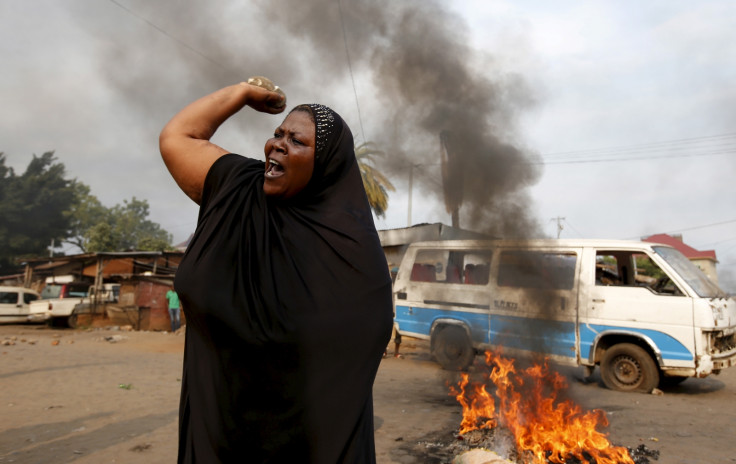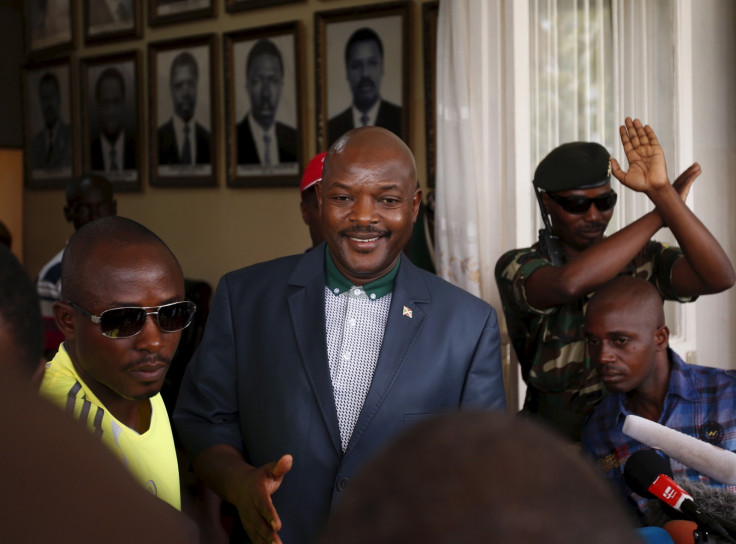Burundi: European Union threatens government with 'targeted measures' amid rising violence

The European Union (EU) has threatened Burundi's government with sanctions as it called on all stakeholders to "resume dialogue on all areas of disagreement between the parties".
"The EU is determined to adopt, if necessary, targeted restrictive measures against those whose actions might have led or might lead to acts of violence and repression and serious human rights violations, and/or might hamper the search for a political solution within the framework proposed by the African Union and the East African Community," the general secretariat of the Council of the EU said.
It is estimated that around 80 have died and around 150,000 civilians have sought refuge in neighbouring countries since the start of the violence on 26 April, when the National Council for the Defense of Democracy (CNDD-FDD) nominated President Pierre Nkurunziza to stand for re-election.
Opposition leaders want the president to step down or withdraw his third-term bid, claiming it violates the country's constitution and the Arusha Accords, a peace deal that ended ethnic civil war and established the foundation for Burundi's post-conflict recovery in 2005.
But Nkurunziza's supporters argue the president's first term should be discounted as he was chosen by the parliament and not by the people in an election, as is specified in the agreement.
Postpone elections, says EU
On Monday (22 June), the EU insisted the elections be postponed because of rising violence.
"Both the EAC and the AU have clearly declared that conditions conducive to the holding of elections are not currently in place. There is a strong likelihood that it will not be possible to put such conditions in place within the time frames provided for in the Burundian Constitution," the Council conclusions on Burundi read.
"The EU urges the Burundian government to accept that this is an accurate reflection of the situation, and to respond to the decisions taken by the Peace and Security Council of the AU by taking specific steps as soon as possible."
Serious human rights violations
According to the EU, both the authorities and the youth wing of the CNDD-FDD have been committing crimes.
"Echoing the United Nations High Commissioner for Human Rights, the EU expresses its deep concern at the numbers of victims and cases of serious human rights violations reported since the beginning of the crisis, particularly those abuses attributed to the security forces and to members of the Imbonerakure," the general secretariat of the council said.

The council also asked that leaders bring a halt to the actions that are at the root of this violence, and urged the Burundian authorities to ensure these events are fully investigated, and "that those responsible are brought to justice".
It added: "The EU reiterates that there can be no impunity for those responsible for serious human rights violations, and that they must be held individually responsible and brought to account in a court of law."
With this in mind, the leaders pressed for the immediate deployment of the human rights observers and military experts, announced by the African Union on 14 June.
Prominent activists and members of the opposition have called on the European Union to take a tougher stance and many have warned Burundi could slip into civil war if the international community does not put pressure on Nkurunziza to negotiate his controversial third-term with the nation's opposition.
The Burundi president stood firm on his decision to run for a third-term in office when he met with leaders of the EAC in Burundi on 15 June.
© Copyright IBTimes 2025. All rights reserved.





















